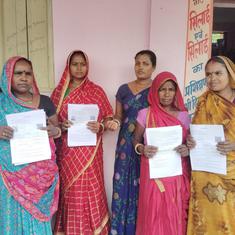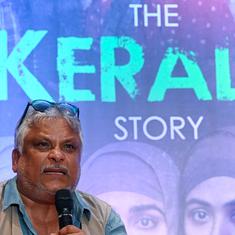EC gave vague, evasive replies to queries on official accountability, consultations: RTI activist
The poll panel seems to think that opacity would serve its purpose better than transparency, Venkatesh Nayak said.

A Right to Information activist on Saturday claimed that the Election Commission gave “vague” responses to queries about the accountability of officials for wrongful inclusion of voters, and about consultations held with political parties.
Venkatesh Nayak, the director of non-governmental organisation Commonwealth Human Rights Initiative, remarked that the poll panel seemed to think that “opacity will serve its purpose better than transparency”.
Nayak filed the first RTI application on June 27, three days after the Election Commission announced the special intensive revision of the electoral rolls in Bihar.
He had asked for information about the legal provisions that required action to be initiated against electoral registration officers or assistant electoral registration officers responsible for the inclusion of persons suspected to be foreign nationals in the electoral rolls.
The application sought a copy of the provisions and the designation of the authority that can order legal action against the EROs or AEROs.
It further sought a state and Union Territory-wise list of officials against whom legal action had been initiated since 2015 to date on the grounds of issuing such orders.
The reply to the query by Shilpi Srivastava, the poll panel’s central public information officer, was “vague and evasive”, Nayak said.
Replying to the first part of the query, Srivastava claimed that “providing legal advice/opinion/interpretation of election laws and providing replies to hypothetical questions is beyond the scope of the RTI Act”.
Replying to the second and third parts of the application, Srivastava said that the information sought was not available with the Election Commission and added that it may be available with the chief electoral officers and district election officers of the states and Union Territories.
“She refused to transfer the RTI application to the CEOs/DEOs as she described the RTI as being related to more than one public authority,” he added.
Citing Section 32 of the Act, Nayak claimed that it was “crystal clear” that it was an omnibus penal provision related to the breach of official duty, which would pertain to non-performance according to statutory requirements.
Noting that it was not strong enough to cover the serious problem of inclusion of ineligible persons, he added that the 1960 Registration of Electors Rules contained an “elaborate procedure” that poll panel officials must follow to determine whether a person is eligible to be entered into the rolls.
“An application cannot simply be accepted for inclusion of the applicant’s name just because it has been submitted by somebody,” he said. “Due diligence must be performed like publishing a list of claims for inclusion on the notice board of the ERO/AERO, inviting objections and then conducting an inquiry, if required, by inviting the applicant to make submissions in support of his claim.”
He added that although the statutory provision for taking action against an ERO or AERO itself was weak, the poll panel had not mentioned in its reply any other applicable provisions in penal laws, including the Bharatiya Nyaya Sanhita.
The Commonwealth Human Rights Initiative director also said that it was clear that the Representation of the People Act cannot be invoked against an errant ERO or AERO without the approval of the Election Commission or the CEO of the concerned state and Union Territory.
“The ECI claims that it has no data about the use of this provision to fix the accountability of such errant officers since 2015,” he said. “Is this because this provision has never been invoked despite ECI’s knowledge of the inclusion of ineligible persons which is demonstrated in its June 2024 Bihar SIR order?”
Nayak asked why the Election Commission had not acted so far to investigate the “phenomenon of wrongful inclusion of ineligible persons” in the electoral rolls. “Or is the ECI trying to shield the errant offices for whatever reason?” he asked.
Second RTI query
Nayak said that the second Right to Information query submitted earlier this year pertained to the meetings that the Election Commission had initiated with political party representatives after the current chief election commissioner, Gyanesh Kumar, took charge in February.
He added that the poll panel had issued a press release in April about the meetings held.
“Within a span of 25 days by the end of March, CEOs [chief electoral officers] are said to have held 40 meetings, DEOs [district electoral officers] held 800 and EROs [electoral registration officers] held 3,879 apparently engaging with more than 28,000 political party representatives,” Nayak said.
The purpose of these meetings was to resolve any pending issues regarding the electoral process, within the framework of existing laws and rules, he added.
In his Right to Information application submitted on April 25, Nayak sought to know the state and Union Territory-wise dates on which the 40 meetings were held across the country, and the names of the political parties that sent representatives for it.
The CHRI director also sought a copy of all action taken reports received till date from the chief electoral officer of every state and Union Territory after the meetings were held.
The Election Commission, however, said on May 20 that it did not have any of the information that he sought. It said that the information may be available with state chief electoral officers, but did not transfer the application to them on the grounds that they are all separate authorities.
Nayak noted that the Election Commission itself had publicly declared in its press note about the meetings in April that the CEOs may send an action taken report about the meetings they conduct along with those held by the EROs and DEOs.
“Irrespective of whether there may be unresolved issues the report must be sent,” he said. “If the CPIO claims that the ECI has no information about these reports, can that be believed? Even if all pending issues were resolved in these meetings, the CEOs would have sent the action taken reports.”
The RTI activist claimed that what was “intriguing” about both the replies was the denial of the existence of even basic information that the poll panel tells the electoral bureaucracy across the country to send to them.
“Despite taking so much flak every week, every month and every year in recent times, the ECI seems to think that opacity will serve its purpose better than transparency,” he said. “With enormous power comes enormous responsibility.”
Bihar voter roll revision
The Election Commission’s responses to the RTI queries came ahead of the publication of the draft electoral rolls in Bihar after a “special intensive revision” exercise.
As part of the exercise, persons whose names were not on the 2003 voter list needed to submit proof of eligibility to vote.
Voters born before July 1, 1987, were required to show proof of their date and place of birth, while those born between July 1, 1987, and December 2, 2004, had to also submit documents establishing the date and place of birth of one of their parents.
Those born after December 2, 2004, needed proof of date of birth for themselves and both parents.
The draft roll was published on August 1 as part of the revision ahead of the Assembly elections expected in October or November in the state. It showed that 65.6 lakh names had been deleted from the list.









